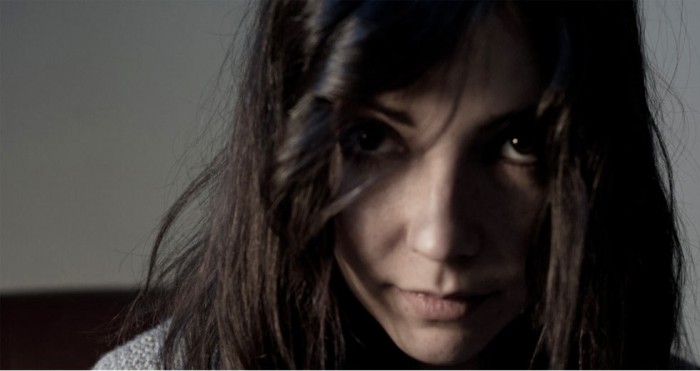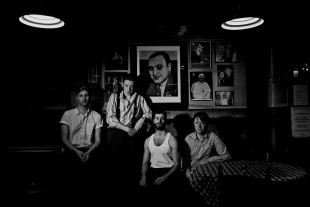In the middle of the last decade, Gudrun Gut’s Monika Enterprise label put out a series of compilations called ‘4 Women No Cry’. The concept behind them was to introduce four female musicians from four different countries to a wider audience, and all 3 comps that were released provided a rich variety of electronic, experimental and esoteric pop music.
Columbia born, Barcelona ‘n’ Berlin based Lucrecia Dalt appeared on the final edition of ‘4 Women No Cry’, which also boasted some of the first tracks released by darling of the underground Julia Holter. A couple of years later a self-released album, ‘Congost’, appeared. Full of enchantingly faded minimal pop, it brought her to the attention of German label Human Ear Music (now HEM Berlin), who’ve released tracks by everyone from John Maus and Maria Minerva to William Basinski and John Cage. It’s a fitting home.
Her first album for HEM came out towards the end of last year. The cover of ‘Commotus’, a latin word meaning ‘woken, provoked, agitated or disturbed’, featured a picture of a gigantic cloud of debris approaching a huddling clutch of vulnerable dwellings in the Texan dust bowl, circa 1935. It’s an incredible image of suspended, impending menace, and the music, though far less volatile, reflects that – switching from the calm before the storm to its eerie eye, and, perhaps most frequently, the stark, haunting aftermath.

The flesh of her music tends to be stripped to the bone, a darkly minimal, bass-heavy brew that makes The xx sound like The Saturdays. The wobbly vocal manipulations and plinky, creepy accompaniments of ‘Saltación’ evoke fellow Berliner Planningtorock, while the languidly gothic ‘Conversa’ is like a slightly enervated ERAAS (perhaps the odd goth touch stems from some nominative determinism related to the famous Sisters of Mercy hit…).
Dalt’s vocals frequently sound like she’s singing in her sleep while having a disturbing dream, which works well on tracks like ‘Silencio’ which drags its feet like a concussed child following the twisted ribbons of a melodica melody (you could imagine much of her music working alongside the strange animations of Ivan Maximov). It’s not unremittingly dark though; the shuffling beats and gently spiraling keyboards of closing track ‘Batholith’ are totally blissful, with a gorgeous guitar coda that sounds like Jackie O Motherfucker at their most transcendental.
Hopes are high, then, for her follow-up album; especially after hearing this mix she did for Tiny Mix Tapes recently. Her explanation of the creative process, which accompanied the mix, is worthy of extended quotation:
“Film became increasingly relevant when I was making the Commotus album, but I was thinking more about imaginary landscapes then, whereas on the new album, film played a key role. I picked around 10 movies I’ve been heavily resonating with during the past year. While recording I used to play these movies on mute and sometimes just randomly, I was turning up the volume for a second while playing back the stems I was working on. Since I am not having any collaboration from other musicians on this album, these movies became the external shifter elements, the vectors of disorientation, guides to other moods. This way my temperament wasn’t the only thing determining the album’s direction.”
It’s a fascinating solution to what can often be a problem for solo artists, who, bereft of the direct influence of other musicians and the sparks of unspoken, even spiritual, connections that collaboration can produce, run the risk of producing music that is staid, single-minded or self-indulgent. This is clearly not a problem for Lucrecia Dalt. She describes how, when composing a record, “dreams and thoughts become louder and more intense, conversations more enjoyable and graspable, ordinary walks become remarkable”. The highest compliment you can pay her music is that listening to it can provoke the same response.






Follow us
Follow us on Facebook Follow us on Twitter Follow us on Google+ Subscribe our newsletter Add us to your feeds